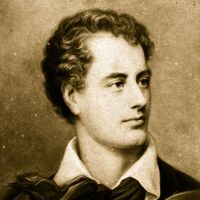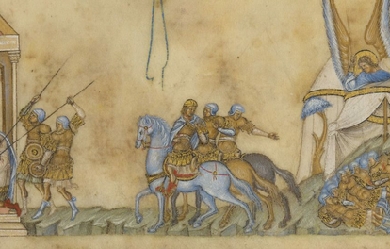The Lament of Tasso
I.
Long years!—It tries the thrilling frame to bear
And eagle-spirit of a child of Song—
Long years of outrage, calumny, and wrong;
Imputed madness, prison’d solitude,
And the mind’s canker in its savage mood,
When the impatient thirst of light and air
Parches the heart; and the abhorred grate,
Marring the sunbeams with its hideous shade,
Works through the throbbing eyeball to the brain,
With a hot sense of heaviness and pain;
And bare, at once, Captivity display’d
Stands scoffing through the never-open’d gate,
Which nothing through its bars admits, save day,
And tasteless food, which I have eat alone
Till its unsocial bitterness is gone;
And I can banquet like a beast of prey,
Sullen and lonely, crouching in the cave
Which is my lair, and—it may be—my grave.
All this hath somewhat worn me, and may wear,
But must be borne. I stoop not to despair;
For I have battled with mine agony,
And made me wings wherewith to overfly
The narrow circus of my dungeon wall,
And freed the Holy Sepulchre from thrall,
And revell’d among men and things divine,
And pour’d my spirit over Palestine,
In honour of the sacred war for Him,
The God who was on earth and is in heaven,
For He has strengthen’d me in heart and limb.
That through this sufferance I might be forgiven,
I have employ’d my penance to record
How Salem’s shrine was won and how adored.
II.
But this is o’er—my pleasant task is done:—
My long-sustaining friend of many years!
If I do blot thy final page with tears,
Know, that my sorrows have wrung from me none.
But thou, my young creation! my soul’s child!
Which ever playing round me came and smiled,
And woo’d me from myself with thy sweet sight,
Thou too art gone—and so is my delight:
And therefore do I weep and inly bleed
With this last bruise upon a broken reed.
Thou too art ended—what is left me now?
For I have anguish yet to bear—and how?
I know not that—but in the innate force
Of my own spirit shall be found resource.
I have not sunk, for I had no remorse,
Nor cause for such: they call’d me mad—and why?
O Leonora! wilt not thou reply?
I was indeed delirious in my heart
To lift my love so loft as thou art;
But still my frenzy was not of the mind;
I knew my fault, and feel my punishment
Not less because I suffer it unbent.
That thou wert beautiful, and I not blind,
Hath been the sin which shuts me from mankind;
But let them go, or torture as they will,
My heart can multiply thine image still;
Successful love may sate itself away,
The wretched are the faithful; 'tis their fate
To have all feeling save the one decay,
And every passion into one dilate,
As rapid rivers into ocean pour;
But ours is fathomless, and hath no shore.
III.
Above me, hark! the long and maniac cry
Of minds and bodies in captivity,
And hark! the lash and the increasing howl,
And the half-inarticulate blasphemy!
There be some here with worse than frenzy foul,
Some who do still goad on the o’erlabour’d mind,
And dim the little light that’s left behind
With needless torture, as their tyrant will
Is wound up to the lust of doing ill:
With these and with their victims am I class’d,
‘Mid sounds and sights like these long years have passed;
’Mid sounds and sights like these my life may close:
So let it be—for then I shall repose.
IV.
I have been patient, let me be so yet;
I had forgotten half I would forget,
But it revives—oh! I would it were my lot
To be forgetful as I am forgot!—
Feel I not wroth with those who bade me dwell
In this vast lazar-house of many woes?
Where laughter is not mirth, nor thought the mind,
Nor words a language, nor even men mankind;
Where cries reply to curses, shrieks to blows,
And each is tortured in his separate hell—
For we are crowded in our solitudes—
Many, but each divided by the wall,
Which echoes Madness in her babbling moods;—
While all can hear, none heed his neighbour’s call—
None! save that One, the veriest wretch of all,
Who was not made to be the mate of these,
Nor bound between Distraction and Disease.
Feel I not wroth with those who placed me here?
Who have debased me in the minds of men,
Debarring me the usage of my own,
Blighting my life in best of its career,
Branding my thoughts as things to shun and fear?
Would I not pay them back these pangs again,
And teach them inward Sorrow’s stifled groan?
The struggle to be calm, and cold distress,
Which undermines our Stoical success?
No!—still too proud to be vindictive—I
Have pardon’d princes’ insults, and would die.
Yes, Sister of my Sovereign! for thy sake
I week all bitterness from out my breast,
It hath no business where thou art a guest;
Thy brother hates—but I can not detest;
Though pitiest not—but I can not forsake.
V.
Look on a love which knows not to despair,
But all unquench’d is still my better part,
Dwelling deep in my shut and silent heart,
As dwells the gather’d lightning in its cloud,
Encompass’d with its dark and rolling shroud,
Till struck—forth flies the all-ethereal dart!
And thus at the collision of thy name
The vivid thought still flashes through my frame,
And for a moment all things as they were
Flit by me;—they are gone—I am the same.
And yet my love without ambition grew;
I knew thy state, my station, and I knew
A Princess was no love-mate for a bard;
I told it not, I breathed it not, it was
Sufficient to itself, its own reward;
And if my eyes reveal’d it, they, alas!
Were punish’d by the silentness of thine,
And yet I did not venture to repine.
Thou wert to me a crystal-girded shrine
Worshipp’d at holy distance, and around
Hallow’d and meekly kiss’d the saintly ground;
Nor for thou wert a princess, but that Love
Had robed thee with a glory, and array’d
Thy lineaments in a beauty that dismay’d—
Oh! not dismay’d—but awed, like One above!
And in that sweet severity there was
A something which all softness did surpass—
I know not how—thy genius master’d mine—
My star stood still before thee:—if it were
Presumptuous thus to love without design,
That sad fatality hath cost me dear;
But thou art dearest still, and I should be
Fit for this cell, which wrongs me—but for thee.
The very love which lock’d me to my chain
Hath lighten’d half its weight; and for the rest,
Though heavy, lent me vigour to sustain,
And look to thee with undivided breast,
And foil the ingenuity of Pain.
VI.
It is no marvel—from my very birth
My soul was drunk with love—which did pervade
And mingle with whate’er I saw on earth;
Of objects all inanimate I made
Idols, and out of wild and lonely flowers,
And rocks, whereby they grew, a paradise,
Where I did lay me down within the shade
Of waving trees, and dream’d uncounted hours,
Though I was chid for wandering; and the Wise
Shook their white aged heads o’er me, and said
Of such materials wretched men were made,
And such a truant boy would end in woe.
And that the only lesson was a blow;
And then they smote me, and I did not weep,
But cursed them in my heart, and to my haunt
Return’d and wept alone, and dream’d again
The visions which arise without a sleep.
And with my years my soul began to pant
With feelings of strange tumult and soft pain;
And the whole heart exhaled into One Want,
But undefined and wandering, till the day
I found the thing I sought—and that was thee;
And then I lost my being all to be
Absorb’d in thine—the world was pass’d away—
Thou didst annihilate the earth to me!
VII.
I loved all Solitude—but little thought
To spend I know not what of life, remote
From all communion with existence, save
The maniac and his tyrant;—had I been
Their fellow, many years ere this had seen
My mind like theirs corrupted to its grave,
But who hath seen me writhe, or heard me rave?
Perchance in such a cell we suffer more
Than the wreck’d sailor on his desert shore:
The world is all before him—mine is here,
Scarce twice the space they must accord my bier.
What though he perish, he may lift his eye
And with a dying glance upbraid the sky—
I will not raise my own in such reproof,
Although 'tis clouded by my dungeon roof.
VIII.
Yet do I feel at times my mind decline,
But with a sense of its decay:—I see
Unwonted lights along my prison shine,
And a strange demon, who is vexing me
With pilfering pranks and petty pains, below
The feeling of the healthful and the free;
But much to One, who long hath suffer’d so,
Sickness of heart, and narrowness of place,
And all that must be borne, or can debase.
I thought my enemies had been but Man,
But spirits may be leagued with them—all Earth
Abandons—Heaven forgets me—in the dearth
Of such defence the Powers of Evil can,
It may be, tempt me further—and prevail
Against the outworn creature they assail.
Why in this furnace is my spirit proved
Like steel in tempering fire?—because I loved?
Because I loved what not to love, and see,
Was more or less than mortal, and than me.
IX.
I once was quick in feeling—that is o’er;—
My scars are callous, or I should have dash’d
My brain against these bars, as the sun flash’d
In mockery through them;—If I bear and bore
The much I have recounted, and the more
Which hath no words,—'tis that I would not die
And sanction with self-slaughter the dull lie
Which snared me here, and with the brand of shame
Stamp Madness deep into memory,
And woo Compassion to a blighted name,
Sealing the sentence which my foes proclaim.
No—it shall be immortal!—and I make
A future temple of my present cell,
Which nations yet shall visit for my sake.
While thou, Ferrara! when no longer dwell
The ducal chiefs within thee, shalt fall down,
And crumbling piecemeal view thy hearthless halls.
A poet’s wreath shall be thine only crown—
A poet’s dungeon thy most far renown,
While strangers wander o’er thy unpeopled walls!
And thou, Leonora!—thou—who wert ashamed
That such as I could love—who blush’d to hear
To less than monarchs that thou couldst be dear,
Go! tell thy brother, that my heart, untamed
By grief, years, weariness—and it may be
A taint of that he would impute to me,
From long infection of a den like this,
Where the mind rots congenial with the abyss—
Adores thee still;—and add—that when the towers
And battlements which guard his joyous hours
Of banquet, dance, and revel are forgot,
Or left untended in a dull repose,
This—this—shall be a consecrated spot!
But thou—when all that Birth and Beauty throws
Of magic round thee is extinct—shalt have
One half the laurel which o’ershades my grave.
No power in death can tear our names apart,
As none in life could rend thee from my heart.
Yes, Leonora! it shall be our fate
To be entwined for ever—but too late!


